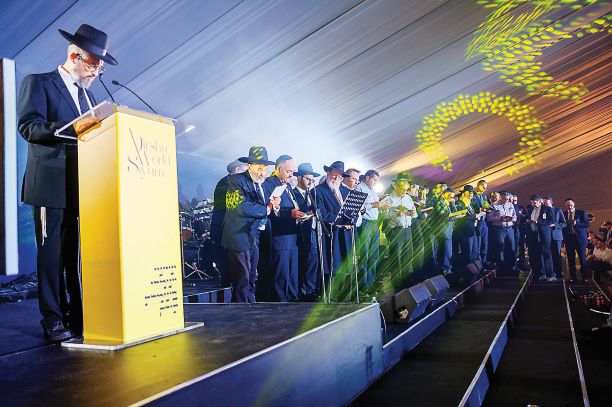
Featured Item

The world’s largest, longest book club
JORDAN MOSHE
We’re talking about the Daf Yomi programme, an international phenomenon in which Jews around the world participate in daily study of the Gemara. From Johannesburg to Jakarta, Daf Yomi (Hebrew for the Daily Page) participants read the 2 711 pages of the Babylonian Talmud – the central text of rabbinic Judaism – in seven and a half years at the rate of one page a day.
Written in a combination of Aramaic and Hebrew, the Talmud is divided into 37 volumes (known as tractates), each of which deals with different aspects of Jewish law. These range from festivals to marriage, to sacrifices and vows, accompanied by extensive rabbinic commentary from across the ages which is often discursive, complicated, and difficult to follow.
Consequently, the text often reads as more of a discussion than anything else. As author Ilana Kurshan writes in her memoire If All the Seas were Ink, “The Talmud is not a law code intended to tell Jews how to behave, but a record of rabbinic legal conversations in which many of the questions are left open and unresolved. It’s a text for those who are living the questions rather than those who have found the answers.”
Complicated though it may be, thousands of Jews participate in the study, all of them literally on the same page in accordance with a schedule established in 1923 in Poland by Rabbi Meir Shapiro, the founder of the mass-reading project. Then 36 years old, Shapiro proposed the programme in August that year at the first International Congress of the Agudath Israel World Movement in Vienna, seeking to unite Jewish people worldwide through daily study of a page of Talmud.
Shapiro’s vision was extraordinary. He wrote of the project, “A Jew travels by boat and takes Gemara Brachot [the Talmud’s first volume] under his arm. He travels for 15 days from eretz Yisrael [the land of Israel] to America, and each day, he learns the daf [page]. When he arrives in America, he finds Jews learning the very same daf that he studied on that day. Another Jew leaves the US, and travels to Brazil or Japan, where he finds everyone learning the same daf he himself learned. Could there be any greater unity of hearts than this?”
His aspiration has persisted across the decades – the seven-and-a-half-year cycle has been completed 13 times to date. The first cycle began on the first day of Rosh Hashanah 5684 (11 September 1923), and the latest was concluded on 4 January this year. Known in Hebrew as a Siyum (completion), the event marks both the end of the previous cycle and the beginning of the next, and is characterised by inspiring speeches and rousing singing and dancing. Indeed, the occasion was hailed with enthusiasm by Jews the world over, and involved mass celebration across the US, Europe, Israel, and other countries.
Thousands of participants filled venues worldwide (ranging from football stadia to indoor arenas), coming together to mark the cycle’s conclusion. The main event in the US took place at New Jersey’s MetLife Stadium, which has 92 000 seats, with a second location at the Barclays Center in Brooklyn. Ten thousand British Jews flocked to London’s Wembley Arena for similar a celebration, and earlier celebrations also took place in December 2019 in Melbourne and Vienna. Even South Africa participated, hosting a show-stopping banquet dinner at The Deck at Wanderers in Illovo, Johannesburg, attended by more than 1 200 people.
As with completion of the Torah on Simchat Torah, the conclusion of the Talmud is never final. Rather, participants return to the beginning again, starting the cycle afresh together with countless first-time participants. While some attend a shiur and learn in a group, others prefer to study alone, reviewing the daily page in their own time. Those who miss a day often do whatever they can to catch up, determined to keep up with the cycle.
Whether one learns alone or with others, the undertaking is vast. The key, writes Kurshan, is to find a way to incorporate a bit of learning into your schedule every day, whatever form that may take. “Some days you may be able to sit down and read the page itself, along with related commentaries and study aides; other days you may have time to listen to a podcast while driving to work or folding the laundry. The point is learning every day, not how you do it.”
The project is more accessible than ever, with texts featuring English translation and commentary available in print, digital, and audio format. So, if you’re looking to join history’s most unconventional book club with a following unlike any other, the Daf Yomi programme can accommodate you at a moment’s notice.




